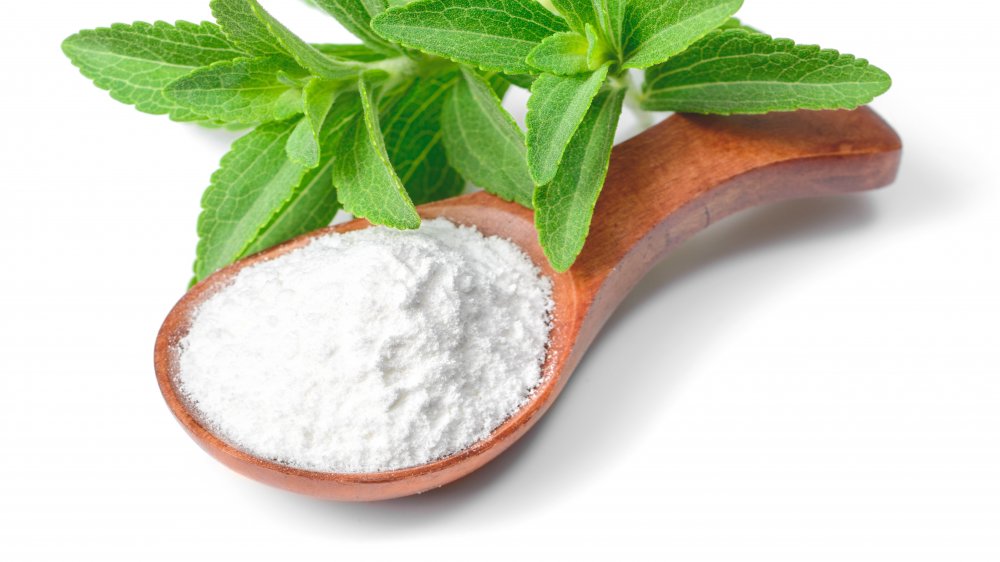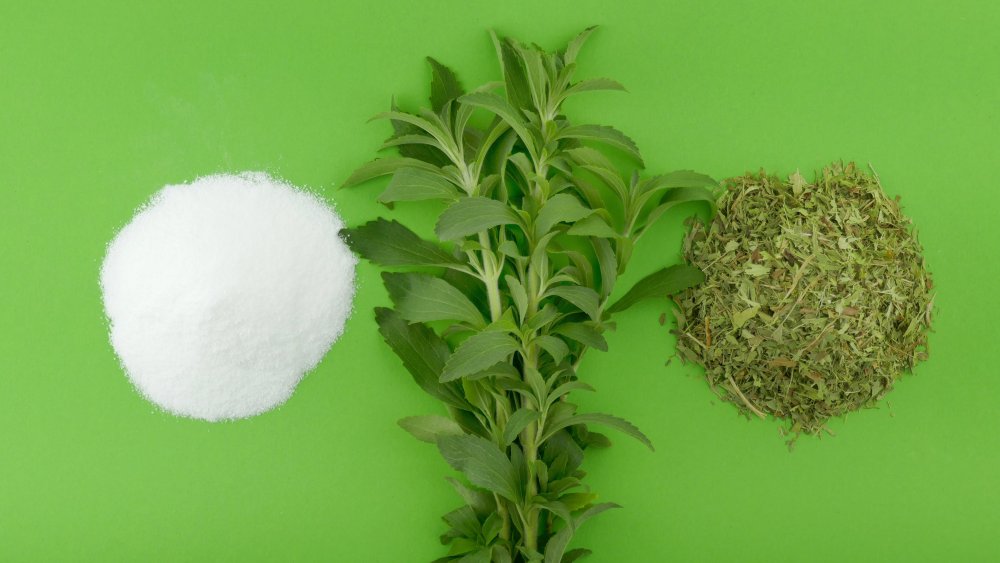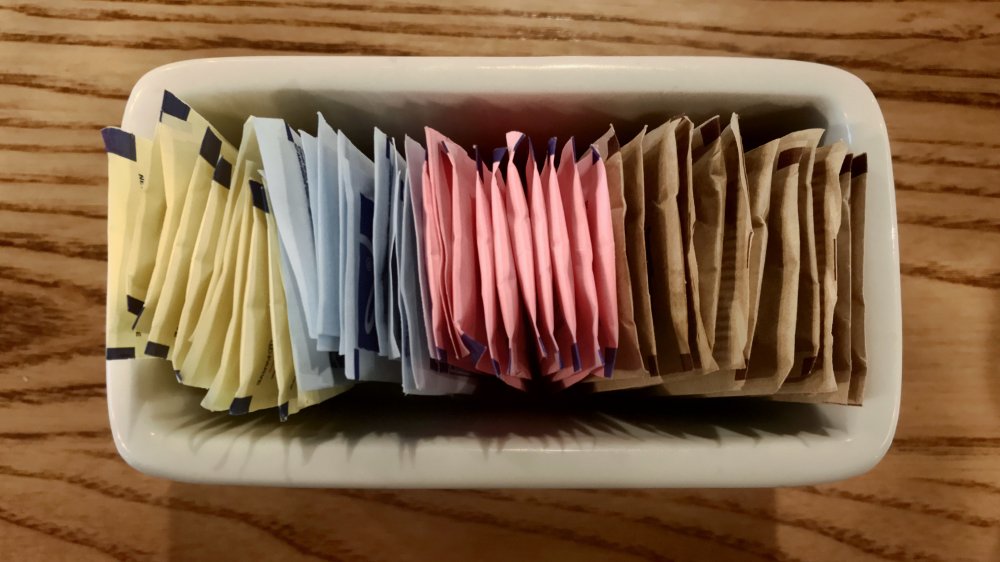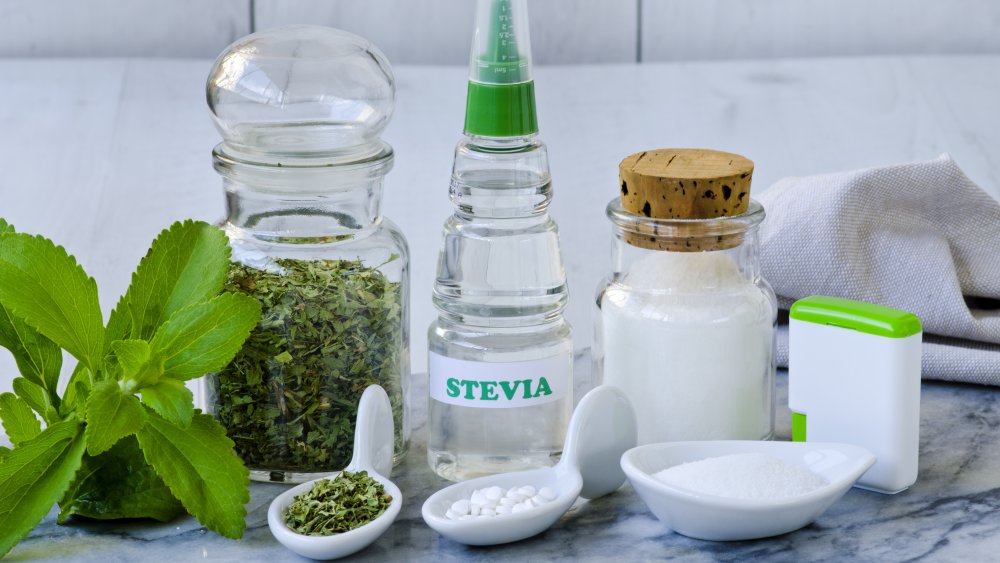The Untold Truth Of Stevia
Stevia is a sugar substitute that is marketed as a healthier alternative to sugar. It is also the most popular, with sales of stevia topping sales of other artificial sweeteners such as aspartame, sucralose, and saccharin. In 2018, the Nielsen research firm reported stevia sales had increased 11.9 percent, even though other artificial sweetener sales were down (via Washington Post). However, there is much more to the story of stevia.
Americans consume more sugar than any other country in the world. The market for calorie-free sweeteners is expected to be worth $16.5 billion in 2020 (via the University of Melbourne). At the same time, information about the negative impact of artificial sweeteners on weight gain and metabolic syndrome has become more widely available. Instead, people have turned to natural sweeteners.
What is a natural product? Well, that depends on marketing and individual interpretation, as the U.S. Food and Drug Administration (FDA) does not regulate the term. The FDA stated: "We expect the term 'natural' to mean that nothing artificial or synthetic (including all color additives regardless of source) has been included in, or has been added to, a food that would not normally be expected to be in that food" (via HuffPost). However, without any regulation, the FDA is essentially relying on the honor system in regard to foods labeled "natural."
Modern use of stevia
Stevia has actually been in use since the 16th century. However, in modern times, it was only approved for use in the United States in 2008, and in Europe, where they have stricter protocols, it wasn't approved until 2011. Stevia is a plant that is native to South America, and it's made into a sweetener by harvesting the leaves, which are dried and then steeped in hot water. The liquid is then filtered and purified to isolate the sweet compounds, removing the stevia extract, which is then dried for use.
As with all sweeteners, stevia is sweeter than regular table sugar. In fact, it is 200 to 400 times as sweet as sugar (via The New York Times). However, while stevia may come from a plant, by the time you eat it in a product that comes in a packet or bag, other sweeteners, carbohydrates, and fibers have also been added to give the stevia more bulk. One of the reasons other sweeteners are added is that a compound of stevia called stevioside usually has a bitter aftertaste, which additional sweeteners hide. For example, Truvia, the top-selling brand of stevia in the United States, is actually mostly erythritol, a sugar alcohol that provides bulk and the appearance of sugar.
The classification of stevia
Studies have shown stevia to be a safe sweetener, with evidence that it doesn't raise blood sugar or lead to cavities. It also may reduce insulin levels. However, the compounds used with stevia can cause problems. For example, erythritol has been known to cause digestive issues in large amounts.
Also, all types of stevia are not the same. Stevia leaves and crude stevia extracts are not approved for use by the Food and Drug Administration (via FDA). Studies on those forms of stevia have caused concerns about blood sugar as well as effects on the reproductive, cardiovascular, and renal systems (via LiveScience).
It is worth keeping in mind that the FDA is not always as strict as scientists think it should be. In the case of stevia, companies have been approved by the FDA to use Rebaudioside A, also known as Reb A, which is an isolated chemical that comes from stevia, as a food additive in sweeteners. Examples of these products include what many think is stevia, such as the aforementioned Truvia, as "Generally Regarded As Safe," or GRAS. However, according to the FDA, these products are not classified as stevia at all.
The impact of stevia on the body
A statement from the FDA said: "In general, Rebaudioside A differs from stevia in that it is a highly purified product. Products marketed as 'stevia' are whole-leaf stevia or stevia extracts of which Rebaudioside A is a component."
However, the use of calorie-free sweeteners has not been found to reduce overall caloric intake. A study found that when participants had a drink containing stevia in place of sugar, they ended up eating more at lunch, resulting in higher increases in blood glucose and insulin. Researchers are also uncertain about the long-term effects of stevia and other calorie-free sweeteners. They could have unintended effects on metabolism.
Stevia is relatively new in regard to what researchers can say for sure about its long-term health effects. It may have positive effects, though it also may not. For those who enjoy using stevia, all indications are that it is safe. Until research determines definitively otherwise, it is likely the best calorie-free sweetener on the market due to the comparative lack of side effects, but as with everything else, it's best to use it in moderation.



